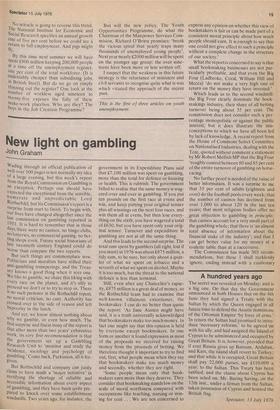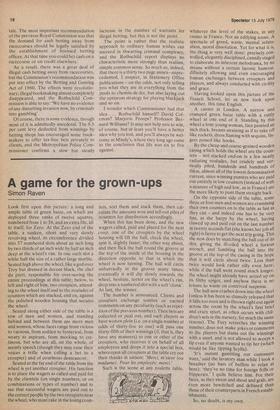New light on gambling
John Graham
Wading through an official publication of well over 500 pages is not normally my idea of a large evening, but this week's report from the Royal Commission on Gambling is an exception. Perhaps one should have expected the exceptional from the sensible, numerate and unpredictable Lord Rothschild, but his Commission's report is a surprise from start to finish. To begin with, our lives have changed altogether since the last commission on gambling reported in 1951. It is hard to remember that in those days there were no casinos, no bingo clubs, no lotteries, no commercial gaming, no betting shops even. Future social historians of late twentieth century England could do worse than compare the two reports. But such things are commonplace now. Politicians and moralists have stilled their anti-gambling trumpetings, and the Treasury knows a good thing when it sees one. We like to gamble, we share this liking with every race on the planet, and it's silly to pretend we don't or to try to stop us. There IS no such pretence in the Rothschild report, no moral criticism, no cant. Authority has crossed over to the side of reason and left hypocrisy in the lurch.
And yet, we know almost nothing about Why we gamble, or even how much. The first surprise and finest irony of the report is that after more than two years' exhaustive work, its very first recommendation is that the government set up a Gambling Research Unit to 'monitor and study the incidence, sociology and psychology of gambling.' Come back, Parkinson, all is forgiven.
But Rothschild and company can justly claim to have made a 'major initiative' in rectifying the shortage of reliable and accessible information about every aspect of gambling, and they have been quite prepared to knock over some establishment windmills. Two years ago, for instance, the government in its Expenditure Plans said that £7,100 million was spent on gambling, more than the total for defence or housing or health. This is rubbish. The government failed to realise that the same money is wagered over and over in gambling. If you put ten pounds on the first race at evens and win, and keep putting your original tenner plus all winnings on the next four races, and win them all at evens, but then lose everything on the sixth, you have wagered a total of £630, but you have spent only your original tenner. Turnover and expenditure in gambling are not at all the same thing.
And this leads to the second surprise. The total sum spent by gamblers (all right, lost if you must) in 1976 was about £875 million, a tidy sum, to be sure, but only about a quarter of what we spent on tobacco and a seventh of what we spent on alcohol. Maybe it is too much, but the threat to the national defence is less than terminal.
Still, even after any Chancellor's rapacity, £875 million is a great deal of money, so the Rothschild team had to examine that well-known villainous extortioner, the bookmaker. I can do no better than quote the report: 'As Jane Austen might have said, it is a truth universally acknowledged that bookmakers make too much-money. In fact one might say that this opinion is held by everyone except bookmakers. In one form or another it found expression in most of the proposals we received for raising money from the proceeds of betting. We therefore thought it important to try to find out, first, what people mean when they say that bookmakers make too much money and secondly, whether they are right. 'Some people mean only that bookmakers earn more than they deserve. They consider that bookmaking stands low on the scale of moral worthiness compared with occupations like teaching, nursing or mining for coal . . . We are not concerned to express any opinion on whether this view of bookmakers is fair or can be made part of a consistent moral principle about how much people should earn. It is enough to say that one could not give effect to such a principle without a complete change in the structure of our society.'
What the report is concerned to say is that small bookmaking businesses are not particularly profitable, and that even the Big Four (Ladbroke, Coral, William Hill and Mecca) 'do not make a very high rate of return on the money they have invested.' Which leads us to the second windmill: the Big Four clearly dominate the bookmakings industry, their share of all betting turnover being about 35 per cent. The commission does not consider such a percentage monopolistic or against the public interest, but it does illustrate the misconceptions to which we have all been led by lack of knowledge. A recent report from the House of Commons Select Committee on Nationalised Industries, dealing with the Tote, qUoted without comment a statement by Mr Robert Mellish MP that the Big Four 'roughly control between 80 and 85 per cent of the entire turnover of gambling on horseracing.'
No further proof is needed of the value of better information. It was a surprise to me that 35 per cent of adults (eighteen and over) do the football pools every week; that the number of casinos has declined from over 1,000 to about 120 in the last ten years; that most religious bodies offer no great objection to gambling in principle; that casinos account for a very small part of the gambling whole; that there is 'an almost total absence of information about the financial stake of the industry'; and that I can get better value for my money at a roulette table than at a racecourse.
The Commission has made 303 recommendations, but these I shall recklessly ignore, ending instead with a cautionary tale. The most important recommendation of the previous Royal Commission was that the demand for cash betting away from racecourses should be legally satisfied by the establishment of licensed betting offices. At that time you could bet cash on a racecourse or on credit elsewhere!
As a result, there was a great deal of illegal cash betting away from racecourses, but the Commission's recommendation was put into effect by the Betting and Gaming Act of 1960. The effects were revolutionary; illegal bookmaking almost completely disappeared, and the Rothschild Commission is able to say: 'We have no evidence of any disturbing invasion now, by criminals into gambling'.
Of course, there issome evidence, though most of it is admittedly anecdotal. The 8.5 per cent levy deducted from winnings by betting shops has encouraged some bookmakers to offer tax-free bets privately to clients, and the Metropolitan Police Commissioner confirms a slow but steady
increase in the number of warrants for illegal betting, but this is not the point.
The point is rather that the realistic approach to ordinary human wishes can succeed in thwarting criminal conspiracy, and the Rothschild report displays no characteristic more strongly than realism, simple common sense. So much so, indeed, that there is a thirty two page annex— unprecedented, I suspect, in Stationery Office publications — on the odds, not only telling you what they are in everything from the pools to chemin-de-fer, but also laying out the optimum strategy for playing blackjack and so on.
I wonder which Commissioner had that idea' . . Rothschild himself? David Coleman? Marjorie Proops? Professor Bernard Williams? It may not help you to win, of course, but at least you'll have a better idea why you lost, and you'll always be welcome at Mindy's, where they long ago came to the conclusion that life was six to five against.



































 Previous page
Previous page